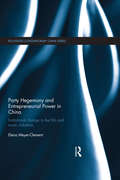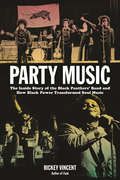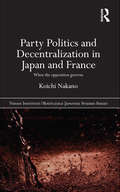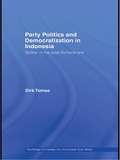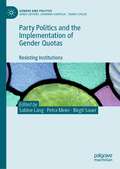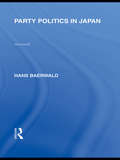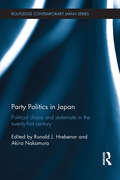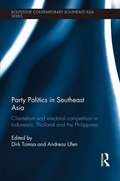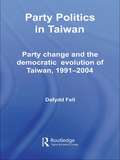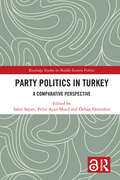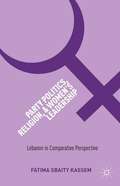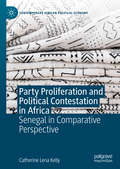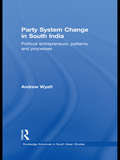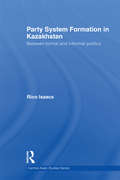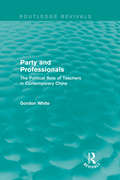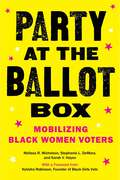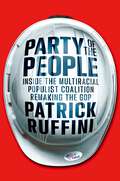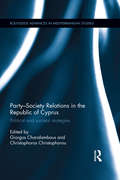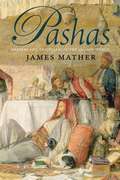- Table View
- List View
Party Hegemony and Entrepreneurial Power in China: Institutional Change in the Film and Music Industries (Routledge Contemporary China Series)
by Elena Meyer-ClementEconomic liberalisation processes and the rapid development of the private sector are widely visible signs of over thirty years of reform policies in the People’s Republic of China. Nevertheless, the Chinese Communist Party (CCP) has managed to preserve the basic political institutions of the Leninist Party-state, including its own unrestrained position of political power. Against this background, this book investigates the interrelationship between processes of marketisation and commercialisation, and the stability of the CCP regime. The aim of the book is to complement existing literature on adaptive governance in China and on the reasons for the CCP regime’s relative stability, while providing new information about the relationship between the Chinese party-state and private entrepreneurs. Taking case studies from the film and music industries, the book gives a detailed account of the political and economic history of these industries in China, with special attention given to the role played by private production companies as intermediaries between artistic creation, political and ideological constraints, and the market. A historical institutionalist approach is employed to trace the effect of Chinese policies on popular culture and the institutions of administrative, economic, political and ideological control over the film and music industries back to the 1950s, revealing the mechanisms and prospects of CCP hegemony in the cultural sector. Examining the effects of the marketisation and commercialisation processes on the communist regime and vice versa, this book also offers a fresh perspective on the origins of today’s Chinese popular cultural mainstream. It will therefore be of great interest to students and scholars of Chinese politics, Chinese culture and media and Chinese government-business relations.
Party Music: The Inside Story of the Black Panthers' Band and How Black Power Transformed Soul Music
by Boots Riley Rickey VincentExamining the culture and politics of the Black Power era of the late 1960s, this book explores the relationship of soul music to the Black Power movement from the vantage point of the musicians and black revolutionaries themselves. The 1960s were a turbulent time for race relations in the United States, but no other area in the country epitomized the radical social change that was taking place more than the San Francisco Bay Area--the epicenter of the Black Panthers movement. This social history introduces fans of soul music and 20th-century U.S. history enthusiasts to the Black Panthers' own band, the Lumpen, a group comprised of rank-and-file members of the Oakland, California-based Party. During their year-long tenure, the Lumpen produced hard-driving rhythm-and-blues that asserted the revolutionary ideology of the Black Panthers. Through his rediscovery of the Lumpen, and based on new interviews with Party and band members, author Rickey Vincent provides an insider's account of Black Power politics and soul music aesthetics in an original narrative that reveals more detail about the Black Revolution than ever before.
Party Politics and Decentralization in Japan and France: When the Opposition Governs (Nissan Institute/Routledge Japanese Studies)
by Koichi NakanoDecentralization is a curious policy for a central government to pursue. If politics is essentially about the struggle for power, why would anyone want to give away the power that one struggled for and won? This book argues that it is precisely party competition in search of power that propels decentralization. Koichi Nakano develops his core argument through in-depth, qualitative research on the politics of reform in France and Japan. Introducing the concept of oppositional policy, he traces the process through which parties in opposition reinvent their ideologies and policy platforms in an attempt to present themselves as the voice of the governed, broaden popular support through the advocacy of enhanced democratic control of government, and proceed to implement some of these oppositional policies after capturing power. This book, thus, takes the role of political parties in the democratic process seriously - parties take up certain issues and espouse certain solutions actively as weapons in the power struggle both on the electoral front and in the policy process. Party competition is not merely a formal condition of democracy; it is also a mechanism with substantive policy impact on its evolution. Party Politics and Decentralization in Japan and France will be of interest to students of Japanese and French politics and comparative politics in general.
Party Politics and Democratization in Indonesia: Golkar in the post-Suharto era (Routledge Contemporary Southeast Asia Series)
by Dirk TomsaParty Politics and Democratization in Indonesia: Golkar in the Post-Suharto Era provides the first in-depth analysis of contemporary Indonesian party politics and the first systematic explanation why Golkar is still the strongest party in Indonesia. Applying a multi-dimensional conceptual framework of party institutionalization theory, the book examines Golkar’s organizational infrastructure, its decisional autonomy and programmatic platform as well as the party’s relations to the mass media. Strengths and weaknesses in the individual dimensions of institutionalization are then contrasted with the corresponding levels of institutionalization reached by Indonesia’s other major parties. Tomsa argues that Golkar remains Indonesia’s strongest party because it is better institutionalized than its electoral competitors. However, while highlighting the former regime party’s strengths in key aspects of party institutionalization, he also shows that Golkar also has some considerable institutional weaknesses which in 2004 prevented the party from achieving an even better result in the general election As an empirical study on Golkar, and Indonesia's other major political parties, this book will be of huge interest to students and scholars of Southeast Asian politics, political parties and elections and democratization.
Party Politics and the Implementation of Gender Quotas: Resisting Institutions (Gender and Politics)
by Sabine Lang Birgit Sauer Petra MeierThis edited collection explores how party politics impacts the implementation of gender quotas in political representation across Europe. Contributors identify actors, institutions, and cultural legacies shape how quotas are put into practice. The volume’s subtitle, Resisting Institutions, points to the myriad ways in which parties and other institutions in Europe over time have resisted the inclusion of women into politics. As voluntary party quotas and legislative quotas gained prominence, so did strategies to undermine them. At the same time, Resisting Institutions also indicates that gender equality actors have developed ways to counter such blockages and advance the cause of parity in their legislatures. 17 country cases explore the current state of quota implementation and the effects of confronting androcentric institutions.
Party Politics in Japan (Routledge Library Editions: Japan)
by Hans H BaerwaldTo the outside observer, the character and dynamics of Japan’s political parties and Diet (National Assembly) are often obscure. This volume is an invaluable description of party politics in Japan, and a unique analysis of the influence that a changing balance of power has had upon the functioning of the Diet. The book covers: the party system and how it has changed since 1955; the electoral systems for the Representatives and Councillors in the Diet. An extensive analysis of the Diet’s internal governance; a discussion of the influence on the Diet’s functioning and role of the arrival of "near parity" between the governing and opposition parties. The book is based on numerous interviews with Japanese politicians, journalists and bureaucrats, as well as extensive discussions with Japanese political scientists.
Party Politics in Japan: Political Chaos and Stalemate in the 21st Century (Routledge Contemporary Japan Series)
by Ronald J. Hrebenar Akira NakamuraThe Japanese political system is a parliamentary democracy and was the first western style government in Asia when the parliamentary system was adopted in the 1880s. It has a multiparty system, free elections, and a parliament that functions much the same way that any other democratic parliament functions, however for much of its existence the Japanese party system has been dominated by one party. This fact is crucial to understanding contemporary politics in Japan, especially since the long term ruling party, the Liberal Democratic Party, is once again back in power. This book presents an up-to-date analysis of the political parties that make up the Japanese party system and their impact on Japanese politics and government. Given that the executive branch is selected as a result of the pattern of party numbers in the parliament, to understand Japanese politics and policy, one must first know the nature of the ruling and opposition parties and their leaders. Indeed, in the past decade the quality of Japan’s government has been closely associated with the strengths and weaknesses of Japan’s prime ministers and the dominant party in the system. This book focuses on a central question: why Japanese politics and government has been so dysfunctional in the past two decades? With this question in mind, the chapters provide key background information on Japanese politics and political parties; discuss each of the major political parties that have governed Japan since 1955; and finally, examine the December 2012 House of Representatives elections that returned the LDP to power, and the differences between the First (1955-1993) and the Second Post War Party Systems (1993- ). Party Politics in Japan provides a comprehensive analysis of the past sixty years of Japanese party politics. As such, it will be of great interest to students and scholars of Japanese politics and Asian politics, as well as to those interested in political parties and political systems more broadly.
Party Politics in Southeast Asia: Clientelism and Electoral Competition in Indonesia, Thailand and the Philippines (Routledge Contemporary Southeast Asia Series)
by Dirk Tomsa Andreas UfenContributing to the growing discourse on political parties in Asia, this book looks at parties in Southeast Asia’s most competitive electoral democracies of Indonesia, Thailand and the Philippines. It highlights the diverse dynamics of party politics in the region and provides new insights into organizational structures, mobilizational strategies and the multiple dimensions of linkages between political parties and their voters. The book focuses on the prominence of clientelistic practices and strategies, both within parties as well as between parties and their voters. It demonstrates that clientelism is extremely versatile and can take many forms, ranging from traditional, personalized relationships between a patron and a client to the modern reincarnations of broker-driven network clientelism that is often based on more anonymous relations. The book also discusses how contemporary political parties often combine clientelistic practices with more formal patterns of organization and communication, thus raising questions about neat analytical dichotomies. Straddling the intersection between political science and area studies, this book is of interest to students and scholars of contemporary Southeast Asian politics, and political scientists and Asian Studies specialists with a broader research interest in comparative democratization studies.
Party Politics in Taiwan: Party Change and the Democratic Evolution of Taiwan, 1991-2004 (Politics in Asia)
by Dafydd FellIn 1991 Taiwan held its first fully democratic election. This first single volume of party politics in Taiwan analyzes the evolution of party competition in the country, looking at how Taiwan’s parties have adjusted to their new multi-party election environment. It features key chapters on: the development of party politics in Taiwan the impact of party change on social welfare, corruption and national identity party politics in the DPP era. Including interviews with high-ranking Taiwanese politicians and material on the 2004 Presidential election, this important work brings the literature up-to-date. It provides a valuable resource for scholars of Chinese and Taiwanese politics and a welcome addition to the field of regime transition and democratization.
Party Politics in Turkey: A Comparative Perspective (Routledge Studies in Middle Eastern Politics)
by Pelin Ayan Musil Sabri Sayarı Özhan DemirkolAlthough the literature on party politics has significantly advanced both methodologically and theoretically in recent years, the study of political parties in Turkey has been noticeably disconnected and lacking from such conversations. This book evaluates well-established theories and trends in exiting party politics literature and relates them to the case of Turkey. It explores fundamental questions such as: Who controls party organizations and how does the locus of control change over time? What kinds of power struggles are observed inside a party and between whom? What do the present and past records of party membership imply for party organizations? What role do grassroots activists play in local and national politics? How do the ideological orientations of party members differ from party leaders and other voters? What types of social cleavages shape political parties and how do they change over time? What constitutes the relationship between the state and parties today? Who finances political parties and what does this imply about the quality of democracy? How and why do party systems change? The various chapters show that party politics in the Turkish context is significantly different to Western and new democracies. By highlighting the significant contribution the Turkish case can make to existing conceptual frameworks and theories, this book will be a valuable resource for anyone studying political parties, party systems and comparative politics, as well as Turkish politics.
Party Politics, Religion, And Women’s Leadership
by Fatima Sbaity KassemExploring the interlinkages of political parties, religiosity, and women's leadership and nominations to public office, this book argues that as party religiosity increases, women's chances of assuming leadership positions fall. Combining qualitative and quantitative methods, it advances a new theory of party variation in religiosity.
Party Proliferation and Political Contestation in Africa: Senegal in Comparative Perspective (Contemporary African Political Economy)
by Catherine Lena KellyThis book analyzes several components of democratization and party competition in West Africa focusing on Senegal – a country with one of the longest histories of multiparty elections. It does so in service of examining the origins and consequences of the proliferation of political parties, a trend that has taken hold in Senegal and a variety of other African countries. The author uses novel sources of data to illuminate the economic and political roots of party functions and trajectories by placing party formation, opposition, ruling party loyalty, and presidential turnover into local and regional contexts. This work will appeal to African Studies scholars, professors, graduate students, and policy makers.
Party System Change in South India: Political Entrepreneurs, Patterns and Processes (Routledge Advances in South Asian Studies)
by Andrew WyattThis book provides a systematic exploration of party system change. By applying the concept of political entrepreneurship and using a detailed case study of the south Indian state of Tamil Nadu, it demonstrates how party leaders can exercise their agency and drive party system change. Recent developments in Tamil politics are taken into account in the light of the literature on party systems, achieving a classification of the party system and revealing patterns of change. The author explains the process of the change by comparing the careers of successful and failed party leaders, thus identifying the factors that enabled some political entrepreneurs to successfully found political parties and contribute to the process of party system change. Examining issues such as regional parties, political entrepreneurship, social change, caste and religious nationalism, the book illustrates the key forces shaping contemporary Indian politics, and presents an example of how the trend toward identity politics and the rising influence of regional political parties are fashioning a new Indian polity. With a broad cross-disciplinary appeal, the book will be of interest to students of South Asian politics, comparative politics, sociology and anthropology.
Party System Formation in Kazakhstan: Between Formal and Informal Politics (Central Asian Studies)
by Rico IsaacsSince the collapse of the Soviet Union, Central Asian states have developed liberal-constitutional formal institutions. However, at the same time, political phenomena in Central Asia are shaped by informal political behaviour and relations. This relationship is now a critical issue affecting democratization and regime consolidation processes in former Soviet Central Asia, and this book provides an account of the interactive and dynamic relationship between informal and formal politics through the case of party-system formation in Kazakhstan. Based on extensive interviews with political actors and a wide range of historical and contemporary documentary sources, the book utilises and develops neopatrimonialism as an analytical concept for studying post-Soviet authoritarian consolidation and failed democratisation. It illustrates how personalism of political office, patronage and patron-client networks and factional elite conflict have influenced and shaped the institutional constraints affecting party development, the type of emerging parties and parties’ relationship with society. The case of Kazakhstan, however, also demonstrates how in the former Soviet space political parties emerge as central to the legitimization of informal political behavior, the structuring of factional competition and the consolidation of authoritarianism. The book represents an important contribution to the study of Central Asian Politics.
Party Weird: Festivals & Fringe Gatherings of Austin
by Howie RicheyIn 1839, Texas officials toasted their new capital of Austin, and its citizens never ran out of excuses for revelry. Austinites celebrate their homegrown and vibrant culture, renowned and innovative music, street life and collective quirkiness with pride. While world-class events now call the city home, in a culture that eschews conformity at every turn, Austin's underground social gatherings are what truly earn it bragging rights. Discover the grass-roots origins of the enigmatic eccentricity that has drawn people from all corners of Texas and now from the whole world. Feel the beat of drum circles at Eeyore's Birthday Party in April, sling puns at the annual O. Henry Pun-Off or share a meal with strangers at the monthly Perpetual Potluck Picnic--or Jim O's, as the locals say. Author Howie Richey explores the offbeat, exuberant culture and history of the city that started with a party that just didn't stop.
Party and Professionals: The Political Role of Teachers in Contemporary China
by Gordon WhiteOriginally published in 1981, this study fits into a wider context of works analysing the impact of the social revolution on the structure of Chinese society since 1949. Party and Professionals focuses on the teaching profession in relation to social ranking. As a part of the intelligentsia, the socialist government has an ambiguous relationship with teachers of all levels and this work aims to highlight the government�s political interactions with teaching professionals. This title will be of interest to students of Asian studies, Politics, International Relations and History.
Party at the Ballot Box: Mobilizing Black Women Voters
by Melissa R. Michelson Stephanie L. DeMora Sarah V. HayesHow the Party at the Mailbox efforts in 2020-2024 led by Black Girls Vote used celebrations of community to increase voter turnoutBlack voters continue to transform America’s electoral landscape and can play a powerful role in determining the outcome of elections. In Party at the Ballot Box, Melissa R. Michelson, Stephanie L. DeMora, and Sarah V. Hayes explore the impact of celebratory voter mobilization campaigns led by Black-led organizations on Black turnout, particularly as more states embrace voting-by-mail.Focusing on the Party at the Mailbox (PATM) initiative, coordinated by Black Girls Vote, Michelson, DeMora, and Hayes underscore what, exactly, motivates Black voters to show up to the polls. Using community-based informational and celebratory packages of materials, and with a mixed methods approach that includes randomized controlled trials, surveys, interviews, and focus groups, they show us how the PATM pilot increased Black turnout in Baltimore by double digits in the 2020 primaries. Despite voting by mail while sheltering in place, PATM made voters feel part of something bigger than themselves—that they were voting as a community. The successful pilot led to further PATM efforts in Atlanta, Baltimore, Detroit, Richmond, and Philadelphia between November 2020 and November 2024.Ultimately, the authors argue that Black Americans vote as a celebration of community, and that cultivating that sense of community is an effective means of increasing Black voter turnout. With a foreword by Nykidra Robinson, founder of Black Girls Vote, Party at the Ballot Box provides insights into Black voter turnout and its larger implications.
Party of the People: Inside the Multiracial Populist Coalition Remaking the GOP
by Patrick RuffiniAn eye-opening, &“must-read&” (Ben Shapiro, founder of The Daily Wire) about the future of the Republican party as they unite working-class voters in a multi-racial, cross-generational populist coalition.Donald Trump&’s victory in the 2016 presidential election shocked the world. Yet his defeat in 2020 may have been even more surprising: he received 12 million more votes in 2020 than in 2016 and his unexpectedly diverse coalition included millions of nonwhite voters, a rarity for the modern Republican party. In 2020, Trump defied expectations and few journalists, strategists, or politicians could explain why Trump had nearly won reelection. Patrick Ruffini, a Republican pollster and one of the country&’s leading experts on political targeting, technology, and demography, has the answers—and the explanation may surprise you. For all his apparent divisiveness, Trump assembled the most diverse Republican presidential coalition in history and rode political trends that will prove significant for decades to come. The shift is profound: seven in ten American voters belong to groups that have shifted right in the last two presidential elections, while under three in ten whites with a college degree belong to votes groups that are trending left. Together, this super-majority of right-trending voters forms a colorblind, populist coalition, largely united by its working-class roots, moderate to conservative views on policy, strong religious beliefs, and indifference to or outright rejection of the identity politics practice by the left. Not all these voters are Republican, and in certain corners of the coalition, only a small minority are. But recent elections are pointing us towards a future where party allegiances have been utterly upended. The Party of the People demonstrates this data. Ruffini was as wrong as every pollster in 2016 and spent the intervening years figuring out why and developing better methods of analyzing voters in the digital age. Using robust data, he shifts you away from the complacent, widespread narrative that the Republican party is a party of white, rural voters. It is, but more importantly for its longevity, it&’s a party of non-college-educated voters. And as fewer voters attend college, the Republican party shows no signs of stagnation. With rich data and clear analysis, Party of the People is a &“deeply researched book&” (Amy Walter, editor-in-chief of The Cook Political Report) that explains the present and future of the Republican party and American elections.
Party-Society Relations in the Republic of Cyprus: Political and Societal Strategies (Routledge Advances in Mediterranean Studies)
by Giorgos Charalambous Christophoros ChristophorouThe Republic of Cyprus' social and political culture is deeply partitocratic, with a close relationship between state apparatus and the parties that influence the government's decisions. However, little is known about the social and political implications of the above traits, and even less about how parties influence and are influenced by society at large. The concept of linkage, which refers to the linking of citizens with government and the political process, is vital in the study of the electoral or ideological considerations of parties. Parties' decisions regarding their organization and image correlates with the effort made to keep up with public opinion. Party-Society Relations in the Republic of Cyprus adds a new dimension to the study of linkage, considering the complexity of civil society as well as exploring the dynamics of political parties. Bringing together specialists from a range of disciplines, it examines the wider effects of partitocracy on democracy and uses it as a frame for exploring the construction, maintenance or deformation of links between social groups and parties. Through its analysis of both the partisan and societal aspects of party-social relations, it illuminates larger questions concerning the strategic complexity involved when politics and society interact. Approaching the Republic of Cyprus as a representative case study of partitocratic political culture, this book is a key resource for those interested in party and civil society politics, as well as Cypriot, Mediterranean and South-East European politics.
Paryatan Bhugol First Semester FYBA New NEP Syllabus - SPPU: पर्यटन भूगोल प्रथम सत्र एफ.वाय.बी.ए. नवीन एन.इ.पी. अभ्यासक्रम - सावित्रीबाई फुले पुणे यूनिवर्सिटी
by Prof. Dr. Jyotiram Chandrakant More Prof. Dr. Sanjay Dagu Pagar Prof. Dr. Dilip Dnyaneshwar Muluk Prof. Nitin Bajirao Borseपर्यटन भूगोल हे पुस्तक सावित्रीबाई फुले पुणे विद्यापीठाच्या नवीन राष्ट्रीय शैक्षणिक धोरण (NEP) 2020 अंतर्गत विकसित केले गेले आहे. "पर्यटन भूगोल" या पुस्तकात पर्यटनाच्या संकल्पना, घटक, प्रकार आणि नियोजनाच्या तांत्रिक बाबींचा सखोल अभ्यास केला आहे. पुस्तकामध्ये पर्यावरणीय, सामाजिक, सांस्कृतिक व आर्थिक दृष्टिकोनातून पर्यटनाच्या विविध पैलूंचा आढावा घेतला आहे. सत्र 1 मध्ये पर्यटन भूगोलाची व्याख्या, स्वरूप, पर्यटनाचे वर्गीकरण व आधुनिक प्रकार मांडले आहेत. सत्र 2 मध्ये सहल नियोजन, आवश्यक तंत्रज्ञान, पासपोर्ट-व्हिसा प्रक्रिया, आणि राष्ट्रीय-आंतरराष्ट्रीय सहल नियोजनाचा समावेश आहे. पुस्तक विद्यार्थ्यांसह, पर्यटन व्यवसायाशी संबंधित प्राध्यापक, संशोधक व पर्यटकांसाठी अत्यंत उपयुक्त आहे.
Paryatan Bhugol Second Semester FYBA New NEP Syllabus - SPPU: पर्यटन भूगोल दुसरे सत्र एफ.वाय.बी.ए. नवीन एन.इ.पी. अभ्यासक्रम - सावित्रीबाई फुले पुणे यूनिवर्सिटी
by Dr Shailesh Wagh Prof. Siddharth Sonawane'पर्यटन भूगोल' हे पुस्तक प्रथम वर्ष कला (सत्र-२) साठी NEP अभ्यासक्रमानुसार तयार करण्यात आले आहे. डॉ. शैलेश वाघ आणि प्रा. सिद्धार्थ सोनावणे यांनी लिहिलेल्या या पुस्तकात पर्यटन भूगोलाची ओळख, व्याख्या, स्वरूप आणि महत्त्व या मूलभूत संकल्पना स्पष्ट केल्या आहेत. पुस्तकात पर्यटन विकासावर परिणाम करणारे प्राकृतिक, सामाजिक-सांस्कृतिक आणि राजकीय घटक सविस्तरपणे मांडले आहेत. यामध्ये हवामान, धार्मिक स्थळे, राष्ट्रीय उद्याने यांचा समावेश आहे. तसेच, कृषी पर्यटन, इको-टुरिझम, वन्यजीव, आरोग्य आणि क्रीडा पर्यटन यांसारख्या पर्यटनाच्या आधुनिक प्रकारांची माहिती दिली आहे. पुस्तकाच्या दुसऱ्या भागात सहल नियोजनाची प्रक्रिया, त्याचे घटक आणि तंत्रे यावर लक्ष केंद्रित केले आहे. यामध्ये सहलीची पूर्वतयारी, आवश्यक कागदपत्रे (पासपोर्ट, व्हिसा), संगणकाचा वापर आणि बुकिंग व्यवस्था यांसारख्या व्यावहारिक बाबींचा समावेश आहे. राष्ट्रीय व आंतरराष्ट्रीय सहल नियोजनाची उदाहरणे देऊन हे पुस्तक विद्यार्थी, अभ्यासक आणि पर्यटकांसाठी एक उपयुक्त मार्गदर्शक ठरते.
Parzival and Titurel (Oxford World's Classics Series)
by Richard Barber Cyril Edwards Wolfram Von EschenbachWritten in the first decade of the thirteenth century, Parzival is the greatest of the medieval Grail romances. It tells of Parzival's growth from youthful folly to knighthood at the court of King Arthur, and of his quest for the Holy Grail. Exuberant and gothic in its telling, and profoundly moving, Parzival has inspired and influenced works as diverse as Wagner's Parsifal and Lohengrin, Terry Gilliam's film The Fisher King, and Umberto Eco's Bandolino. <p><p>This fine translation, the first English version for over 25 years, conveys the power of this complex, wide-ranging medieval masterpiece. The introduction places Eschenbach's work in the wider context of the development of the Arthurian romance and of the Grail legend. This edition also includes an index to proper names and a genealogical table, and is the first to combine Parzival with the fragments of Titurel.
Pasado imperfecto. Los intelectuales franceses: 1944-1956
by Tony JudtUn ensayo sobre la irresponsabilidad y la condición moral de la intelectualidad francesa. Tras la Liberación, los intelectuales franceses regresaron al frente de la Historia. Pero las ideas políticas y las pasiones de estos intelectuales acabaron resultando polémicas. En Pasado imperfecto, Judt analiza los conflictos más controvertidos de esta comunidad intelectual: cómo responder a la promesa y a la traición del comunismo, y cómo mantener un compromiso con esas ideas radicales frente a la hipocresía de la Unión Soviética de Stalin, de los nuevos estados comunistas de la Europa del Este y de la propia Francia. Para toda una generación, esto fue un grave dilema moral, sus respuestas fueron condicionadas por la guerra y la ocupación, y las opciones políticas de la postguerra permanecieron inquietantes en la conciencia de las generaciones posteriores de intelectuales franceses. El análisis de Judt va más allá de los escritos delas personalidades «existencialistas», como Jean-Paul Sartre, Albert Camus o Simone de Beauvoir, e incluye a una amplia comunidad intelectual de filósofos católicos, periodistas no alineados, poetas y críticos literarios, y comunistas y no comunistas por igual. Pero los dilemas intelectuales de la postguerra continúan. Los intelectuales franceses no han aceptado del todo el sentido de la «irresponsabilidad moral» de entonces. El resultado, según Judt, es una herencia de confusión que ha perjudicado a la categoría cultural de Francia, sobre todo en relación con la antigua Europa del Este y su liberación, y que reflejó la gran dificultad de la nación para afrontar su propio pasado ambivalente. Reseña: «Un libro que rebosa ideas, que ofrece una teoría exhaustiva del intelectual. [...] Logra entretener y provocar con perfecta coherencia.»The Washington Post
Paseos por la calle de la amargura: Y otros rumbos mexicanos
by Guillermo SheridanUna colección de ensayos, crónicas y ficciones sobre las desventuras de la política mexicana, así como sus personajes y situaciones arquetípicas. Por "la calle de la amargura", estrecha y sobrepoblada, se pasean como si nada lo mismo AMLO que Peña Nieto, los ricachones fastuosos y los abundantes políticos, la tenaz clase media, la selecta realeza de los líderes sindicales y la republicana desvergüenza de gobernadores y legisladores. "La calle de la amargura" conduce también a algunas encrucijadas del pasado reciente. Camina por ella, haciendo una pregunta incómoda, el padre de uno de los 43 de Ayotzinapa. Pasan Octavio Paz y Carlos Fuentes escribiendo a dos voces una crónica epistolar del 68; pasan los agentes secretos de Washington y del Kremlin; Elena Garro va a una fiesta que cambiará su vida; José Revueltas camina hacia la cárcel y Juan Rulfo hacia su soledad. Desde hace años, ante un miedo ambiente que en México empeora a diario, Sheridan practica el raro arte del periodismo como defensa personal, lanzando crítica y diatribas a izquierda y a derecha, siempre con ironía, agria inteligencia y humor mercurial.
Pashas: Traders And Travellers In The Islamic World (PDF)
by James MatherThe fascinating, forgotten story of when Europe and Islam first met Long before they came as occupiers, the British were drawn to the Middle East by the fabled riches of its trade and the enlightened tolerance of its people. The Pashas, merchants and travelers from Europe, discovered an Islamic world that was alluring, dynamic, and diverse. Ranging across two and a half centuries and through the great cities of Istanbul, Aleppo, and Alexandria, James Mather tells the forgotten story of the men of the Levant Company who sought their fortunes in the Ottoman Empire. Their trade brought to the region not only merchants but also ambassadors and envoys, pilgrims and chaplains, families and servants, aristocratic tourists and roving antiquarians. Unlike the nabobs who gathered their fortunes in Bengal, they both respected and learned from the culture they encountered, and their lives provide a fascinating insight into the meeting of East and West before the age of European imperialism. Intriguing, intimate, and original, Pashas brings to life an extraordinary tale of faraway visitors beguiled by a mysterious world of Islam.
